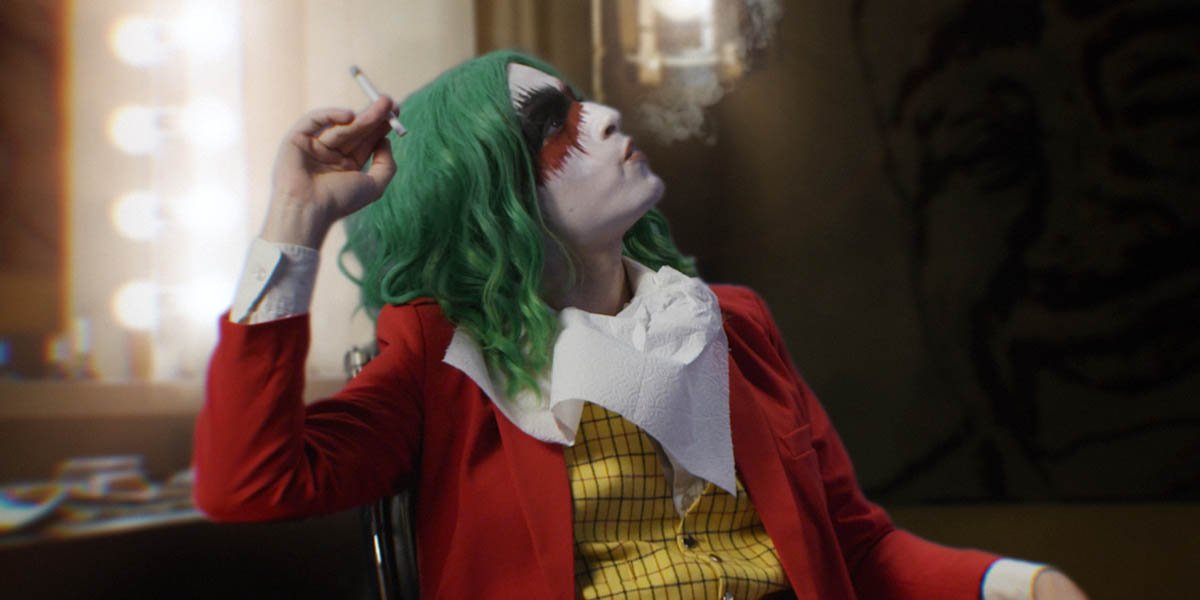By Andrea Thompson
Ah, autumn. For others, it means leaves changing, pumpkin spice lattes, spooky fun, and sweaters. For film critics, it means a whole lot of film festivals that we insist on running ourselves ragged for. Why should that change? For those afflicted with cinephilia, it’s a fantastic way to experience films that wouldn’t otherwise be discoverable, even in our supposedly stuffed-with-options streaming content era.
Personally, I have immersed myself in the Chicago Underground Film Festival, the Reeling International Film Festival, and am now turning my attention to the Chicago International Film Festival, which features an absolute beauty of a lineup this year. And one particular offering seemed to almost beg for a place in this recently revamped Directed By Women column: “The People’s Joker”.
Like last week’s focus, “T Blockers,” “The People’s Joker” is a trans film, and there’s a whole lot of horror contained in it without its characters being reduced to their oppression. But where “T Blockers” is a Gen Z anthem of defiance made by a budding artist just on the cusp of what will hopefully be a long and promising career, Vera Drew’s “The People’s Joker” is a millennial tale full of hard-lived wisdom and steeped in meta.
It’s also an incredibly low budget movie that’s equal parts queer coming-of-age story, extremely unauthorized superhero parody, and love letter to queer creatives. And filmed in a style that I can only describe as mixed media dystopian zine fused with pure camp.
If that sounds baffling, that’s nothing against you or me, it’s merely part of the gleefully deranged, utterly fearless experience that is viewing this movie. IP doesn’t generally lend itself to much creativity in our incredibly corporatized environs, but Drew, who not only directs, but co-writes and stars as the lead, a trans girl who eventually blooms into her true identity as Joker the Harlequin, makes gleeful use of beloved fan favorites of the DC universe, as well as her many inspirations.
Batman’s problematic nature has been discussed and dissected long before this, but in “The People’s Joker” he’s not only a corporate fascist who’s unleashed a vicious army of drones onto Gotham, he’s also a predatory closeted gay man who grooms and exploits the penniless orphans he takes in. When Joker arrives in Gotham to pursue a comedy career after a harrowing childhood in Smallville - the kind only sunny Midwestern repression can dish out - she meets and falls for one of them, Jason Todd (Kane Distler), a young queer boy who has since refashioned himself into a Leto-esque Joker.
This isn’t only a setup for a toxic relationship that the older, wiser Joker the Harlequin uses as a guide for how to recognize abuse, it’s also a way for Drew to throw a whole lot of shade, with much of her ire reserved for Lorne Michaels and his toxic stranglehold on the state of comedy itself. He may be the catalyst for Harlequin’s rebellion and subsequently forming her own anti-comedy troupe that becomes her found family of recognizable DC villains, but Drew isn’t about to allow her own story to become subsumed in any sense.
And what a story, which doesn’t only incorporate fan conspiracy theories, Michelle Pfeiffer’s legendary Catwoman transformation, but shout-outs to “Goodfellas,” with Harlequin proclaiming she “always wanted to be a Joker,” and bringing in the Necronomicon itself for a cameo.
It’s a lot for a tight, 92 minute runtime that’s also a sincere laugh riot in the way stories from those who have not only survived but thrived tend to be. Drew’s most important inspirations get their due right away however. The film is dedicated to “Mom and Joel Schumacher.”


